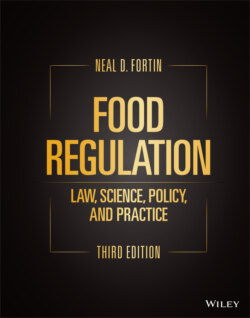Читать книгу Food Regulation - Neal D. Fortin - Страница 149
3.8.3 Gluten
ОглавлениеGluten is a food of public health significance, but it is not an allergen. Because gluten intolerance shares some similarity with allergic reactions, some other nation’s laws by definition group gluten as an allergen. This is a good example of a term of art, where the term “allergen” is defined in the law for convenience to mean “allergens plus some additional substances.”
Gluten is not an allergen, and it is not in the U.S. list of major allergens. The United States has approached the management of gluten content with regulation of “gluten free” labeling rather than specifically requiring gluten labeling. The FALCPA directed FDA to define “gluten free” labeling rather than requiring gluten labeling.
“Gluten” is defined as “the proteins that naturally occur in a gluten‐containing grain and that may cause adverse health effects in persons with celiac disease (e.g., prolamins and glutelins).” The grains with naturally occurring gluten are three specific grains—wheat, rye, and barley—and their crossbred hybrids (e.g., triticale).76
